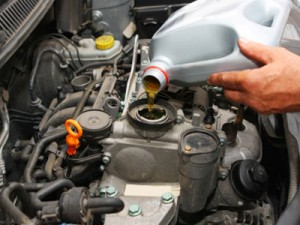
What is an oil change?
The engine in your car works hard. Or more specifically the components that make up the engine work hard. There’s an awful lot of grinding, friction and heat going on under that hood. Your engine oil is the lubricant that keeps subsequent wear and tear in check. But, if left for too long without changing, that oil starts to accumulate dirt, grit and gunk, which in turn increases the effects of the wear and tear. Think of the engine and oil change as a sick patient getting a blood transfusion.
Why is it important?
Thermal Breakdown: Car engines function at very high temperatures which in turn can frequently cause oil to go through what’s called a ‘Thermal Breakdown’. This chemical reaction basically amounts to a serious degradation of the engine oil. This in turn affects the oils ability to flow smoothly and properly coat the engines components. The subsequent friction severely shortens the lifespan of an engine.
Engine Gunk: Engine combustion inevitably leads to your car’s engine collecting a substantial build-up of carbon deposits. This gunk, which collects on the pistons, cylinders and valves, eventually hardens and, if left unattended, can limit the amount of air and fuel the valves let in. This can lead to less efficient burning of fuel and possible overheating, which in turn leads to oil stress.
Corrosion: Aside from gunk, engine oil also collects water, dust and dirt. This debris gradually corrodes engine components if not removed. Fresh oil helps flush out these unwanted fragments.
Congested Filters: Changing the oil should always be accompanied by a changing of the filter too. Filters serve an important purpose – preventing sludge from getting to the engine. Failure to change the filters regularly leads to an unhealthy congestion of particles such as dirt, degraded oil and combustion sludge. That means less good quality oil makes its way to your engine. And the less oil your engine receives the worse of your engine will be. “
Leaks: From time to time gas or coolant can leak into oil, contaminating it in the process and eventually damaging the engine. There is no way to know whether this is happening short of having the oil changed.
Money Saver:
This is the most important thing that you will do to ensure your engine lasts the distance. Regular oil changes are recommended every 3 months or 3000 miles (whichever comes first) so learning how to do it yourself will not only save you money in the here and now, it will also prevent further more expensive costs occurring further down the line.
How do I change my car’s oil?
Drain the Oil: Lift the car, and let it heat up. This will get the oil warm and churned, which in turn will help it drain more easily. If the engine is hot, let it cool down for AT LEAST 30 minutes. Remove the oil plug underneath the car (it’s a large bolt on the oil pans bottom). A complete drain usually takes about two minutes.
Remove and replace the Oil Filter: The easiest way to locate the oil filter is to look at your new filter and search for a similar part. Before removing the filter make sure you have your bucket / oil pan positioned below. Ensure the rubber gasket ring comes off too, otherwise your new filter won’t get a sufficient seal on the engine. Smear some new oil on the gasket ring of the new filter and thread it on. Make sure it’s tight.
Adding New Oil: Refill the engine using a funnel and recap the bottle before you toss it into the recycling bin. Check with a dipstick if you’re not sure if you have put enough in. Once satisfied, screw the cap back on tight.
Run the engine: Start the car and run the engine for 5 minutes. This brings the engines oil pressure levels back to where they need to be, while also allowing you to check if there are any leaks by the oil plug and filter. If there are leaks or spots, clean them, and tighten the plug as needed.
When changing my car oil, what do I need?





